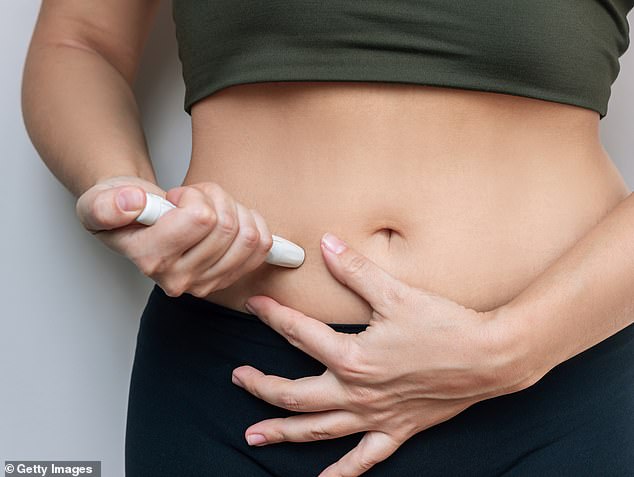This summer thousands of women, including me, will be jetting off to the sun, giddy with excitement about the prospect of revealing their slimmed bodies on the beach – all thanks to weight-loss injections.
But if you’re still on the jabs, the idea of a holiday may be fraught with anxiety. Should you take your pen with you or dose up before you go? Stick to your diet plan or dive head-first into the all-you-can eat buffet?
Here we reveal your expert-approved pre-holiday checklist:
Pack or put away?
If you are only going away for seven to ten days, you can choose to time your jabs to fit around your holiday rather than take your pen with you.
One option if you’re away for a week or ten days, is to gradually nudge your jab day in the preceding weeks (as long as you ensure at least five days between jabs) so you can take your dose on the morning that you travel. This way you can enjoy good suppression for most of the trip, then rely a little more heavily on willpower as the suppression subsides in the days before you return home.
Or you can just skip a week when you’re on holiday. Dr Dan Marsh of The Plastic Surgery Group, says: ‘If you don’t want to take your pen with you then take your usual dose on the normal scheduled day before you leave, and then restart as soon you get back, continuing your regular weekly schedule on the same dose from that new day on your return.’

If you’re still on the jabs, the idea of a holiday may be fraught with anxiety
Tell your insurer
You might not have told your friends, but you’ve got to tell your travel insurer before you set off that you’re taking weight-loss jabs to ensure your policy is valid.
Simon McCulloch, of insurers Staysure, says: ‘Weight-loss injections are prescription drugs with real medical implications, and that means they need to be treated seriously when buying a policy.’
While the jabs can be effective and safe when used correctly, they can carry side effects such as gastrointestinal issues (such as nausea, vomiting or diarrhoea), dehydration and in some cases, rare complications like pancreatitis or gallbladder problems. From the insurer’s perspective, any condition or medication that might increase the likelihood of medical treatment while abroad can result in higher premiums or exclusions.
Some policies classify use of jabs as a pre-existing medical condition, particularly if they are prescribed for obesity or type 2 diabetes, which can bump up the premium.
McCulloch even recommends making sure your GP has recorded your jab protocol in your medical notes: ‘This helps ensure your policy accurately reflects your current health, especially if a claim needs to be made.’ Some insurers require a doctor’s note confirming that your health is stable, and you have not experienced an adverse reaction to the drugs.
Get a cool pack
Buy an insulated travel case with cool pack inserts (around £10 online).
The manufacturers of Wegovy and Mounjaro recommend that once started, pens are kept refrigerated (two to eight degrees Celsius). But don’t worry, the liquid inside them remains stable at room temperature, up to 30 degrees, for at least three weeks.

Women, including me, will be giddy about the prospect of revealing their slimmed bodies
‘I recommend using a medical-grade travel cooler or an insulated medication or cooler bag to help maintain a consistent temperature and protect against fluctuations,’ says Rachael Joy, chief clinical officer at SheMed.
A chilled case means peace of mind that your pen isn’t being exposed to extremes of temperature or direct sunlight that could degrade the liquid. Ask hotel staff to freeze the mini ice packs to ensure your pen stays cool.
Keep in carry on
Hold baggage can be exposed to extreme temperatures and you risk losing your pen if your bag is delayed or lost.
It should travel in your hand luggage and be brought out at airport security, to go through the scanner in a clear plastic bag with any other liquids you might be carrying. Most airport staff are trained in handling medical exemptions, and an explanation will usually be enough.
Check the destination
‘Generally, travelling with a personal supply of GLP-1 medication is acceptable worldwide, but regulations can vary so it is best to check the rules for the country before travelling,’ advises Joy.
Visit your destination country’s official embassy or consulate website online to check. Dr Dan Marsh warns that some countries require a prescription and/or a letter from your doctor stating your name and medication details, and the prescriber’s signature too.
Take the box
Prescription details are printed on a label stuck to the side of the box, so take the box with you in case airport security or customs officers have questions. Keep the information leaflet with you too (not a photograph of the box and/or leaflet).
Make a diet plan
Bigger meals and rich food may trigger side effects (such as nausea). If you’ve been avoiding alcohol, you might feel its effects faster too.
When faced with a buffet, Catherine Bell, dietitian at Juniper, says pick protein first (meat, fish, tofu, etc) to help feel full and support muscle health, then top up with fibre (vegetables, salads) to keep your gut moving.












